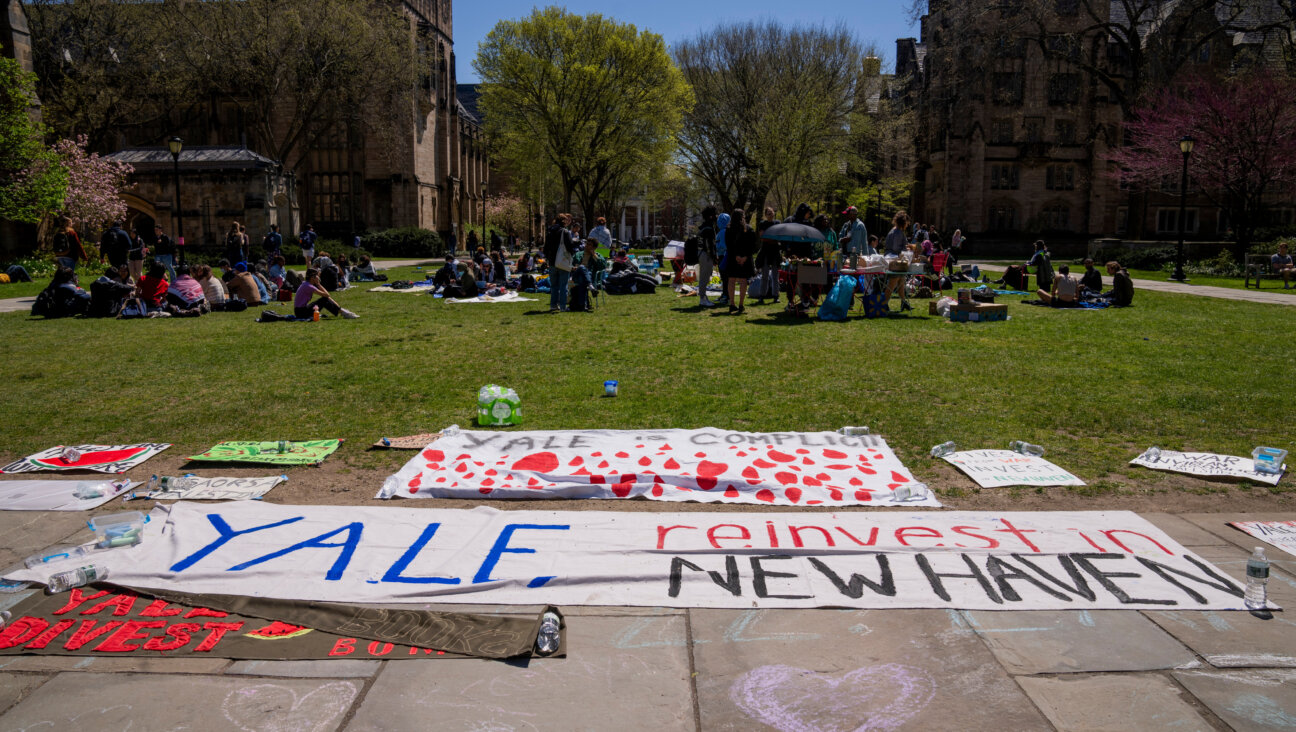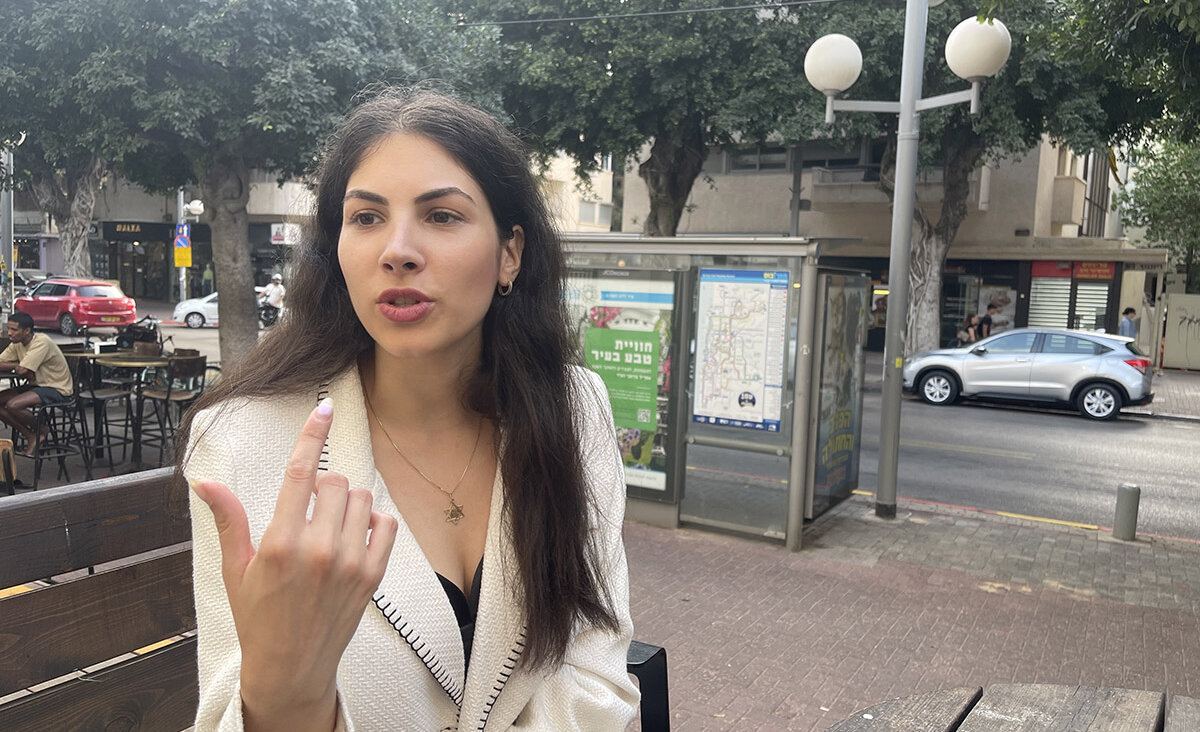‘Jews not allowed’: As Erdogan praises Hamas, antisemitism rages on the ground in Turkey

Anti-Israel banners are a common sight in Istanbul, October 2023. (David I. Klein)
ISTANBUL (JTA) — “Jews not allowed,” read the sign in English and Turkish above Rağman Şahaf, a used book store next to Istanbul University and not far from the city’s famed Grand Bazaar.
Even after the sign was taken down on Friday, the store’s owner said he stuck by the message.
“I do not want to buy anything from Jews right now, I do not want to sell anything to Jews right now, this is how I tell them,” Ozkan Mustafa Küçükkural told the Jewish Telegraphic Agency.
“Maybe it should have said Zionist or Israeli, but I was angry and emotional,” he added. “My brothers in Palestine are dying.”
Anti-Israel banners and graffiti, along with Palestinian flags, have become commonplace across Istanbul, as many of its citizens fume over Israel’s response to the Hamas attacks on Oct. 7 that left over 1,400 dead. Images have also circulated of taxis with signs saying that their drivers would not serve Israelis.
Antisemitic incidents have taken place beyond Istanbul, too. In Izmir — a city once home to tens of thousands of Jews now in the midst of a small-scale Jewish revival — a synagogue was defaced with graffiti that read “Murderer Israel” on Saturday.
Turkish President Recep Tayyip Erdoğan, who has had an up and down relationship with Israel over the course of his 20 years as Turkey’s head of state, has come out firmly defending Hamas’ actions on Oct. 7, calling the terrorist group a “a liberation group.” In response, Israel recalled its diplomats from Turkey on Saturday.
It has all amounted to a tense atmosphere for Turkish Jews, who now number around 15,000 and descend mainly from Sephardic families but also include Ashkenazi, Romaniote and Mizrahi communities. That number was close to 80,000 in the founding year of Turkey’s republic in 1923 — exactly 100 years ago on Sunday.
Antisemitic rhetoric has spread throughout Turkish politics, too. A day after a hospital in Gaza was hit by rocket fire on Oct. 17, a politician from Turkey’s ruling AKP party, Süleyman Sezen, representing a small municipality called Atakum in the Black Sea city of Samsun, said at a public hearing that he was praying for the soul of Hitler, adding that the world will find peace when it is cleansed of Jews and that the Holocaust was “unfinished.” Evidence showing that the explosion was likely from a Palestinian Islamic Jihad rocket has not nullified such outbursts.
“The Hitler rhetoric is not new in Turkey,” said Turkish-Jewish publisher and author Rifat N. Bali, who has written about political Islam’s portrayal of Jews. “I cannot say that it comes from ultranationalist political fractions… Why? Because they are fed day in, day out, pictures of ‘babies killed by IDF.’”

Turkish President Recep Tayyip Erdogan attends a rally in solidarity with Palestinians in Istanbul, Oct. 28, 2023. (Efekan Akyuz/Middle East Images/AFP via Getty Images)
On Oct. 10, Huda-Par parliamentarian Şahzade Demir addressed the Turkish parliament, calling to revoke citizenship for Turkish Jews if they volunteer for the Israeli military. Days later, Yeni Akit, a far-right media outlet, called for Turkish Jews to be denaturalized, under the false claim that they all have dual Israeli citizenship. (The Hrant Dink Foundation, a Turkish NGO devoted to minority issues in the country and named after a murdered Armenian-Turkish Journalist, has called out Yeni Akit as among the most prolific publishers of hate speech in Turkish media.)
“This fear scenario is not new. It was also brought up during the Mavi Marmara controversy, and the issue of citizenship of Jews who are citizens of the Republic of Turkey and who served in the Israeli army was brought to the agenda,” said Serdar Korucu, who writes a column on antisemitism in Turkey for the Jewish site Avlaremoz. He was referencing a deadly clash between the Israeli army and a flotilla of pro-Palestinian activists from Turkey in 2010. “There has never been such a practice in the history of the Republic of Turkey. The harshest sanction would be to prevent them from doing military service in the future.”
Several large pro-Palestinian protests have taken place in Istanbul since Oct. 7. In one demonstration, Turkish protesters briefly breached the fence of the Israeli consulate before being dispersed by Turkish police.
Erdogan, who had warmed to Israel in recent years, has regularly met with leaders of Hamas, which is considered a terrorist organization by the United States, the European Union and most Western powers. His foreign ministry said in a statement on Sunday that it rejects the idea that its rhetoric on Israel has been antisemitic.
“We reject the baseless accusations of anti-Semitism, and the slander and insults against our President and our country,” read the statement released on Sunday. “It is known to everyone that Türkiye’s track record on this issue is spotless — unlike many countries that support Israel unconditionally today.
“It is a truth acknowledged by all historians that Türkiye has been a safe haven for all those who were oppressed throughout history, including the Jews,” it added.
In 1492, the Ottoman Sultan, Bayezid II, sent ships to Spain to ferry exiled Spanish Jews to his empire, resulting in the country’s large Sephardic community of today. But Turkish Jews have also faced several periods of oppression, including an infamous tax in the 1940s and pogrom in the 1950s which have become the subject of a popular Turkish Netflix series.
The local Jewish response to the situation has not been all shock and dismay. Jacob Behar, a Turkish Jew who owns a shop around the corner from the Istanbul shop that had the “Jews not allowed” sign, expressed disappointment at the sign but said it didn’t make him feel insecure.
“It doesn’t represent the general ideals of Turkish society,” he told JTA. “My family has been here over 500 years, we wouldn’t still be here if we didn’t feel safe. Of course, there are individual things, but there are also individual things in Israel.”
This article originally appeared on JTA.org.

I hope you appreciated this article. Before you go, I’d like to ask you to please support the Forward’s award-winning journalism this Passover.
In this age of misinformation, our work is needed like never before. We report on the news that matters most to American Jews, driven by truth, not ideology.
At a time when newsrooms are closing or cutting back, the Forward has removed its paywall. That means for the first time in our 126-year history, Forward journalism is free to everyone, everywhere. With an ongoing war, rising antisemitism, and a flood of disinformation that may affect the upcoming election, we believe that free and open access to Jewish journalism is imperative.
Readers like you make it all possible. Right now, we’re in the middle of our Passover Pledge Drive and we still need 300 people to step up and make a gift to sustain our trustworthy, independent journalism.
Make a gift of any size and become a Forward member today. You’ll support our mission to tell the American Jewish story fully and fairly.
— Rachel Fishman Feddersen, Publisher and CEO
Join our mission to tell the Jewish story fully and fairly.
Only 300 more gifts needed by April 30






















